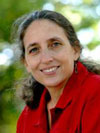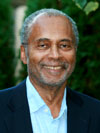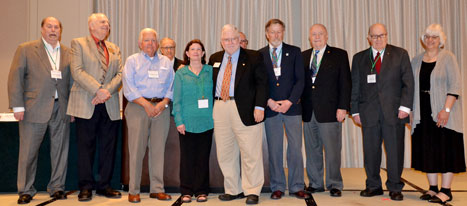AAG Distinguished Scholarship Honors: Anthony Bebbington, Ruth DeFries
The 2015 AAG Distinguished Scholarship Honors is presented to Dr. Anthony J. Bebbington and Dr. Ruth DeFries.
Bebbington will receive this award for his exceptional record of scholarly achievement and policy relevance in the fields of development studies, natural resource management, and sustainable livelihoods.
DeFries is being recognized for the contributions that she has made to our understanding of the patterns and impacts of anthropogenic landscape change, and for her ability to link that research to larger international policy discussions aimed at reducing greenhouse gas emissions from tropical deforestation.
Citations for Anthony J. Bebbington and Ruth DeFries follow.
Anthony Bebbington, Clark University

Dr. Anthony J. Bebbington is awarded the Association of American Geographers 2015 Distinguished Scholarship Honors for his record of achievement in development and environmental studies especially his path-breaking research on natural resources, poverty reduction, livelihoods and sustainable development in the Andes and beyond, and its recognition by policy makers and practitioners of development.
This recognition is most evident in his election to the National Academy of Sciences in 2009, a rare tribute to a relatively young scholar. Bebbington is noted for his interdisciplinary approaches in the fields of development studies, political science, economics, agriculture science, and geography. His research has contributed to the understanding of sustainable rural development, natural resource management, poverty, and social movements such as indigenous and grassroots organizations, especially in Latin America and the Andean region. He has combined extensive fieldwork in Peru and Ecuador, with institutional analyses to promote the understanding and respect of farmers and indigenous knowledge, the role of non-governmental organizations, the value of social capital to development, and the agency and empowerment of people and communities in the developing world. Bebbington’s publications include more than 20 edited or co-authored books, many in Spanish, and numerous journal articles and book chapters such as highly cited papers in World Development, the Annals of the AAG, and Economic Geography.
In addition to his experience in academia, his work informs economic policies in international development agencies such as the World Bank, the CGIAR, and the United Nations Food and Agriculture Organization. These applied aspects of his work have fueled his ability to engage in both applied and theoretical approaches with indigenous groups, as well as global development programs.
Bebbington has taught geography and development at the University of Manchester and the University of Colorado at Boulder, and he is currently Director of the Graduate School of Geography at Clark University. He has supervised a large number of graduate students who have gone on to careers in academia, NGOs and government. His scholarship and policy insights have also had influence through his work with the World Bank, the International Institute for Environment and Development, and the Overseas Development Institute.
It is with great pleasure that we recognize Dr. Bebbington’s extensive and profound contributions to the fields of geography and development studies more broadly.
Ruth DeFries, Columbia University

In recognition of the significant and extensive contributions that she has made to our understanding of the impacts of anthropogenic landscape transformation on climate, biogeochemical cycling, and biodiversity, Dr. Ruth DeFries is awarded the 2015 Association of American Geographers Distinguished Scholarship Honors.
DeFries is currently Denning Professor of Sustainable Development at Columbia University. Prior to joining Columbia in 2008, she was professor in the Geography Department at the University of Maryland, served as senior project officer with the Committee on Global Change at the National Research Council (NRC), and taught at the prestigious Indian Institute of Technology in Mumbai, India. She received her Ph.D. from the Department of Geography and Environmental Engineering at Johns Hopkins University and her B.A. in Earth Science, summa cum laude, from Washington University in St. Louis, MO.
Driven by losses due to expanding human infrastructure, timber harvesting, resource extraction, and agricultural activities, habitat conversion remains the leading threat to global biodiversity. DeFries is credited with transforming the way that scientists track and analyze changes to the planet’s vegetation through the use of satellite imagery, which can cover large areas at repeated time intervals. Landscape transformation may, however, have far reaching impacts beyond the direct conversion of species habitats. Research conducted by DeFries emphasizes the intersections among land use, agriculture, climate and conservation throughout the tropics, with a focus on the Amazon and India. In particular, her work has illuminated the widespread consequences of changing the extent and pattern of Earth’s vegetation, including the effects on emissions of greenhouse gases that cause climate change, the loss of habitat for other species, and the potential movement of disease vectors.
Throughout her career, Dr. DeFries has published over 120 refereed journal articles and book chapters. These have appeared in many of the top journals in the world, including Science, Nature, Proceedings of the National Academy of Sciences, Nature Climate Change, PLos One, Global Change Biology, Remote Sensing of Environment, Ecology and Society, Journal of Biogeography and Conservation Biology, among many others. In recognition of her achievements, she was elected to the U.S. National Academy of Sciences in 2006 and the American Association for the Advancement of Science in 2008. She is also a fellow of the Aldo Leopold Leadership Program, the Ecological Society of America, and the American Geophysical Union, and she has received fellowships from the MacArthur Foundation and the Fulbright Program. She is a lead author on the Intergovernmental Panel on Climate Change (Fifth Assessment) and a member of the NRC’s Board on Environmental Change and Society. She is also a former Chair of the NRC’s Ecosystems, Land Use, and Biodiversity Panel of the Decadal Survey for the Earth Sciences, Vice-chair of the NRC’s Committee on Earth Studies, Space Sciences Board, and member of the NRC’s Committee on the Assessment of NASA’s Earth Science program.




